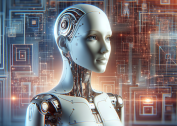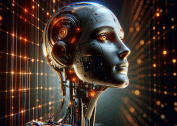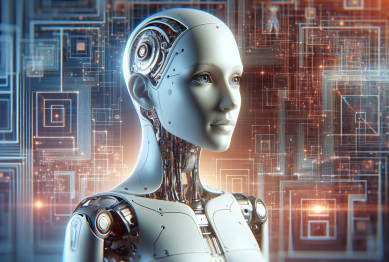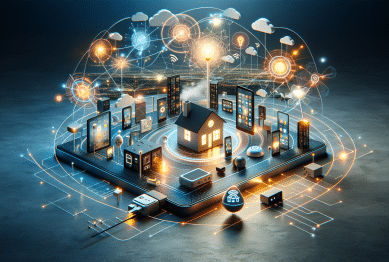Introduction
Artificial Intelligence (AI) is revolutionizing every aspect of our daily lives, from the way we communicate to how we work and even the way we receive healthcare. Whether it’s through virtual assistants like Siri or autonomous vehicles navigating busy city streets, AI is now an integral part of modern society. But beyond the everyday conveniences, what does the future of artificial intelligence look like? This article delves into how AI is changing our lives, explores the emerging trends, and what we can expect as AI technology continues to evolve.

1. AI in Everyday Life: How AI Is Changing Our Lives
AI has become more than just a buzzword; it’s a powerful tool that influences our daily decisions and interactions. From personalized recommendations on Netflix and Amazon to voice recognition technology in our smartphones, AI algorithms analyze vast amounts of data to predict and shape our preferences.
a. Smart Homes and Virtual Assistants
Smart home devices like Amazon’s Alexa and Google Home are prime examples of how AI is transforming household management. These virtual assistants use natural language processing (NLP) to understand user commands and perform tasks, such as setting reminders, controlling smart devices, and even ordering groceries.
According to a report by Statista, over 320 million smart speakers were in use globally in 2022, and this number is expected to rise to 500 million by 2025 (Statista, 2022). This widespread adoption highlights how deeply AI has integrated into our homes, making it easier to control everyday tasks with simple voice commands.
b. AI in Healthcare: Revolutionizing Diagnosis and Treatment
AI is making groundbreaking changes in healthcare, improving patient outcomes and reducing costs. Tools like IBM Watson Health analyze vast medical databases to help doctors diagnose diseases more accurately. Additionally, AI-powered devices can monitor patient vitals in real-time and even predict the likelihood of a heart attack based on historical health data (Forbes, 2023).
The future of AI in healthcare looks even brighter with the development of robotic surgery and AI algorithms that can interpret medical imaging with greater precision than human radiologists. In fact, a study published in The Lancet Digital Health found that AI systems could detect breast cancer with 94% accuracy, compared to the 88% accuracy rate of human experts (Lancet Digital Health, 2021).
2. Emerging AI Trends: What Does the Future Hold?
AI technology is rapidly evolving, and its potential applications are expanding across industries. Here are some of the key emerging trends to watch in the future of artificial intelligence:
a. AI and Autonomous Vehicles
Self-driving cars are no longer a concept of the future—they’re a reality today. Companies like Tesla and Waymo are pushing the boundaries of autonomous vehicle technology, using AI to enable cars to navigate complex environments without human intervention.
However, safety remains a significant challenge. According to a report by the National Highway Traffic Safety Administration, there have been over 400 crashes involving autonomous vehicles since 2021 (NHTSA, 2023). As AI continues to evolve, improving the safety and reliability of self-driving technology will be a primary focus.
b. AI in Customer Service: The Rise of Chatbots
Chatbots and AI-powered customer service representatives are becoming more common in businesses, providing instant support to customers 24/7. Platforms like Zendesk and Intercom are leveraging AI to handle routine inquiries, freeing up human agents to focus on more complex issues.
These AI tools use machine learning and NLP to understand customer queries, learn from past interactions, and provide more accurate responses over time. A Gartner study predicts that by 2027, 25% of all customer service operations will use virtual customer assistants and chatbots (Gartner, 2022).
c. AI in Content Creation: Is AI the Next Writer?
The use of AI in content creation is rapidly growing, with tools like GPT-4 and Jasper AI generating articles, scripts, and even coding solutions. While AI-generated content is still limited in its ability to capture human emotions, it’s becoming increasingly sophisticated in mimicking natural language.
However, the use of AI in creative fields raises ethical concerns about originality and authenticity. Will AI replace human writers, or will it simply act as a tool to enhance human creativity? This is a question that will shape the future of content creation as AI technology progresses.
3. The Ethical Dilemma: Balancing AI’s Benefits and Risks
As AI technology becomes more advanced, it brings both incredible opportunities and serious ethical concerns – that’s how AI is changing our lives. Here are some of the key challenges facing the future of artificial intelligence:
- Bias and Fairness: AI systems are only as good as the data they are trained on. If the training data is biased, the AI will perpetuate these biases, leading to unfair outcomes in hiring, law enforcement, and financial services.
- Privacy Issues: AI relies on large datasets, which often include sensitive personal information. Ensuring that AI respects user privacy is a critical challenge.
- Job Displacement: AI is automating many routine tasks, leading to concerns about job losses in sectors like manufacturing, customer service, and even healthcare.
These challenges highlight the need for strong regulatory frameworks and ethical guidelines to ensure that AI technology is developed and used responsibly.
4. What the Future of Artificial Intelligence Looks Like
The future of artificial intelligence is filled with promise, but also uncertainty. As AI technology becomes more integrated into society, it will continue to reshape industries and redefine what is possible. Here’s a glimpse of what to expect:
- Hyper-Personalization: AI will enable even more personalized experiences, from tailored health treatments to custom learning paths in education.
- AI and Creativity: Tools that assist in music composition, art creation, and even film direction will become more mainstream, blurring the line between human and machine creativity.
- AI for Social Good: AI will play a critical role in addressing global challenges like climate change, disaster management, and pandemic response by providing predictive analytics and optimization solutions.
However, with these advancements comes the need for responsible AI development to ensure that technology serves humanity, rather than creating new societal issues.
5. Conclusion: Embracing AI While Preparing for the Future
AI is already changing our lives in profound ways, and the future of artificial intelligence promises even more transformation. From healthcare innovations to autonomous vehicles and personalized experiences, AI has the potential to enhance our quality of life significantly. But as AI technology continues to evolve, it’s crucial to address ethical considerations and ensure that AI is developed responsibly.
The future of artificial intelligence is bright—but it’s up to us to guide it in the right direction.
References
- Forbes. (2023). AI in Healthcare: Current Applications and Future Trends. Available at: Forbes AI Healthcare
- Statista. (2022). Smart Speaker Adoption Worldwide. Available at: Statista Smart Speaker Data
- Lancet Digital Health. (2021). Artificial Intelligence in Breast Cancer Detection. Available at: The Lancet Digital Health
- National Highway Traffic Safety Administration (NHTSA). (2023). Autonomous Vehicle Crash Reports. Available at: NHTSA
- Gartner. (2022). The Rise of Virtual Customer Assistants. Available at: Gartner Report









